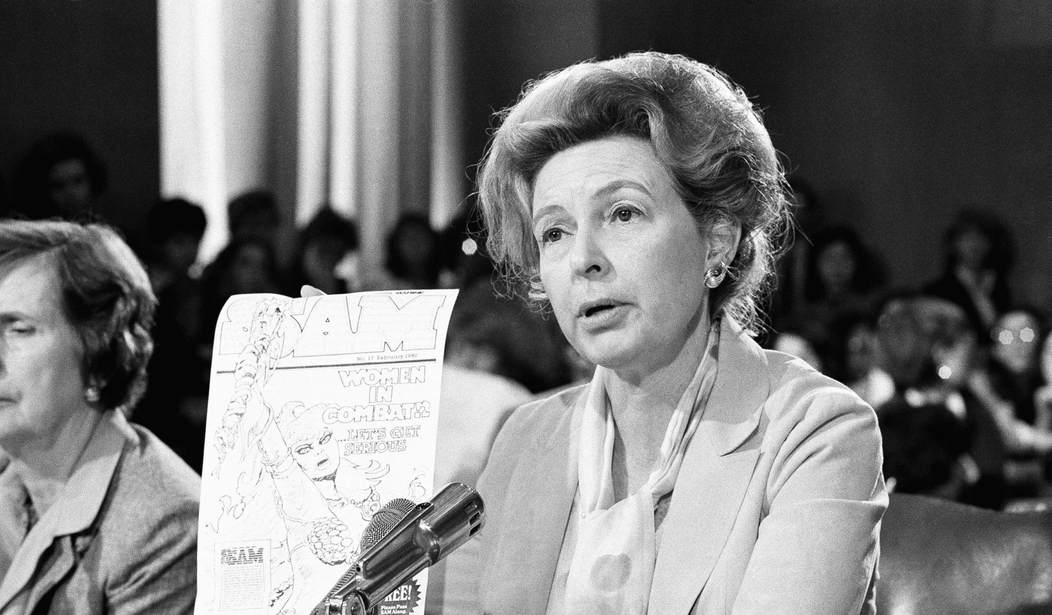Phyllis Schlafly, whose grass-roots campaigns against Communism, abortion and the Equal Rights Amendment galvanized conservatives for almost two generations and helped reshape American politics, died on Monday. She was 92.
Her death was confirmed by the Eagle Forum, the conservative organization she founded in 1975.
In her time, Mrs. Schlafly was one of the most polarizing figures in American public life, a self-described housewife who displayed a moral ferocity reminiscent of the ax-wielding prohibitionist Carry Nation. Richard Viguerie, who masterminded the use of direct mail to finance right-wing causes, called her “the first lady of the conservative movement.”
On the left, Betty Friedan, the feminist leader and author, compared her to a religious heretic, telling her in a debate that she should burn at the stake for opposing the Equal Rights Amendment. Ms. Friedan called Mrs. Schlafly an “Aunt Tom.”
Mrs. Schlafly became a forceful conservative voice in the 1950s, when she joined the right-wing crusade against international Communism. In the 1960s, with her popular self-published book “A Choice, Not an Echo” (it sold more than three million copies) and a growing legion of followers, she gave critical support to the presidential ambitions of Senator Barry Goldwater, the hard-right Arizonan who went on to lead the Republican Party to electoral disaster in 1964, but who planted the seeds of a conservative revival that would flower with the rise of Ronald Reagan.
And in the 1970s, Mrs. Schlafly’s campaign against the Equal Rights Amendment played a large part in its undoing. The amendment would have expanded women’s rights by barring any gender-based distinctions in federal and state laws, and it was within hailing distance of becoming the law of the land: Both houses of Congress had passed it by a vote of more than 90 percent, and 35 state legislatures — only three shy of the number required for adoption — had approved it.
But the amendment lost steam in the late 1970s under pressure from Mrs. Schlafly’s volunteer brigades — mainly women, most of them churchgoing Christians (Mrs. Schlafly was Roman Catholic) and not a few of them lugging apple pies to cajole legislators. Despite an extension of the deadline, the amendment died, on June 30, 1982.
I chose a lengthy obit from The New York Times to illustrate how powerful Schlafly was. When the MSM uses the descriptive “polarizing” for a conservative, it’s generally shorthand for, “one we tried to destroy, but couldn’t.” Schlafly’s power didn’t come from a top-down enforced sociological contrivance, but rather from the strength of her convictions.
Paradoxically, as the archenemy of the feminist movement, Schlafly became the powerful woman they all dreamed of being. By simply being herself she became exceedingly accomplished and a respected leader.
So…”polarizing” to the left.
Next page: Meeting Phyllis Schlafly at CPAC in 2012.
On a personal note, I had the honor of briefly meeting Phyllis Schlafly at CPAC in 2012. I have been in the entertainment industry and politics for almost all of my adult life, and have gotten to know, work with, and befriend a lot of famous people. I don’t get starstruck much, if ever. When I saw her in the lobby of the hotel where CPAC was held that year, I blurted, “Oh my God, is that Phyllis Schlafly?!?!?” My friend John Sexton from Hot Air said, “You want to have your picture taken with her, don’t you?” There was a hint of incredulity in his voice because that really isn’t my style. She was gracious enough to consent to a photo after I babbled on and on about how much I admired her and John took one for me:

She was “polarizing” because she was effective. She was also a tiny, sweet woman who just happened to double as a stone cold bad***.









Join the conversation as a VIP Member